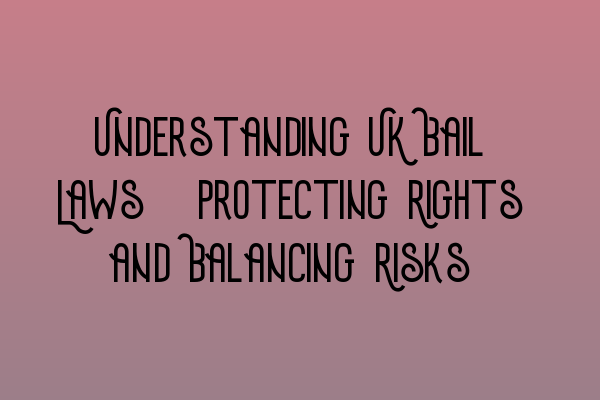Understanding UK Bail Laws: Protecting Rights and Balancing Risks
Bail laws in the UK play a crucial role in the criminal justice system, serving to protect individuals’ rights while balancing the risks associated with releasing an accused person from custody. This article aims to provide a comprehensive overview of UK bail laws, shedding light on the key principles, considerations, and procedures involved. Whether you’re a law student, legal professional, or simply interested in the workings of the criminal justice system, this article will help you grasp the essentials.
Before delving into the intricacies of UK bail laws, let’s define bail. Bail is the legal process through which an accused person is released from police custody, subject to various conditions and obligations. It serves two fundamental purposes: to ensure the accused person’s appearance in court and to safeguard the public interest.
One essential principle underpinning UK bail laws is the presumption of innocence. In line with this principle, every individual is considered innocent until proven guilty. This means that defendants should not be detained unnecessarily pending trial, unless there are valid reasons to believe they may fail to appear in court or pose a risk to public safety.
When considering whether to grant bail, the court will assess several factors, including:
1. Flight Risk: The court will evaluate the likelihood of the accused person intentionally absconding to avoid prosecution. Factors considered may include the defendant’s ties to the community, employment status, financial resources, and previous conduct.
2. Public Safety: The court will assess the potential risk the accused person poses to the public if released. This may involve considering the nature of the offense, previous criminal history, and any evidence suggesting a propensity for violence or harm.
3. Witness Intimidation: If there is a concern that the accused person may interfere with witnesses or obstruct justice if released, the court may be inclined to deny bail.
4. Further Offending: The court will consider whether there is a risk of the accused person committing further offenses while on bail.
5. Victim Safety: If there are concerns for the safety of the victim or witnesses, the court may impose specific conditions or restrictions when granting bail.
In some cases, the court may even consider the accused person’s mental health, vulnerability, or ties to international jurisdictions. These factors are carefully weighed to strike a balance between protecting the rights of the accused and ensuring public safety.
The Bail Act 1976 is the primary legislation governing bail in the UK. It outlines the procedures and conditions for granting bail and sets out the factors that the court must consider. The Act emphasizes that bail is the default position, highlighting the importance of liberty and the presumption of innocence.
In practice, the court may impose various conditions on bail, such as:
– Regular reporting to a police station
– Surrendering travel documents
– Electronic monitoring
– Restriction on contacting certain individuals
– Prohibition from entering specified areas
– Curfew requirements
Conditions are tailored to individual cases based on the specific circumstances and risk factors identified by the court. If an accused person violates their bail conditions, they may be arrested and brought back before the court for a bail revocation hearing.
It is worth noting that the bail landscape in the UK has undergone changes with the introduction of the Solicitors Qualifying Examination (SQE). Aspiring solicitors seeking to qualify in England and Wales will be required to pass the SQE, comprising SQE1 and SQE2 assessments. For those preparing for the SQE, it is important to have a solid understanding of bail laws as they form a core part of criminal law and practice.
To help you in your preparation for the SQE exams, check out our related articles:
– SQE 1 Practice Exam Questions: Enhance your knowledge and test your understanding of criminal law with our extensive collection of practice exam questions.
– SQE 1 Practice Mocks FLK1 FLK2: Familiarize yourself with the format and structure of the SQE 1 exam by taking our practice mocks.
– SQE 2 Preparation Courses: Explore our comprehensive courses designed to help you master the skills required for the SQE 2 assessment.
– SQE 1 Preparation Courses: Get access to tailored courses and resources to excel in the SQE 1 exam.
– SRA SQE Exam Dates: Stay informed about the upcoming SQE exam dates to plan your preparation effectively.
In conclusion, understanding UK bail laws is of paramount importance for both legal professionals and those seeking to navigate the criminal justice system. By protecting the rights of the accused while considering the risks associated with release, bail laws strive to maintain a delicate balance. Whether you’re studying criminal law or preparing for the SQE exams, a solid understanding of bail laws will serve as a foundation for your legal career.
